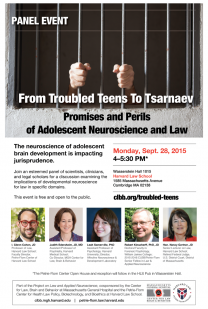The neuroscience of adolescent brain development has had increasing impact on American jurisprudence. The U.S. Supreme Court relied on this neuroscience in Roper v. Simmons (2005) in barring execution for capital crimes committed as a juvenile and in Miller v. Alabama (2012) in holding that mandatory life without possibility of parole for juveniles is also unconstitutional.
On Monday, September 28, 2015, CLBB and the Petrie-Flom Center assembled a panel of developmental scientists, clinicians, and legal scholars for a panel discussion examining the implications of developmental neuroscience for law in specific domains including death penalty mitigation for young adults over age 18 such as the Tsarnaev case, a developmentally informed view of Miranda and Competence to Stand Trial for juveniles, trial of youth as adults, and conditions of confinement in juvenile and adult incarceration.
The panel discussed the promises and perils for constitutional jurisprudence, legal and public policy reform, and trial practice of relying upon a complex body of science as it emerges. Scroll down to view complete video from the event.
This event is part of the Project on Law and Applied Neuroscience, a collaboration between the Center for Law, Brain & Behavior at Massachusetts General Hospital and the Petrie-Flom Center for Health Law Policy, Biotechnology, and Bioethics at Harvard Law School.




